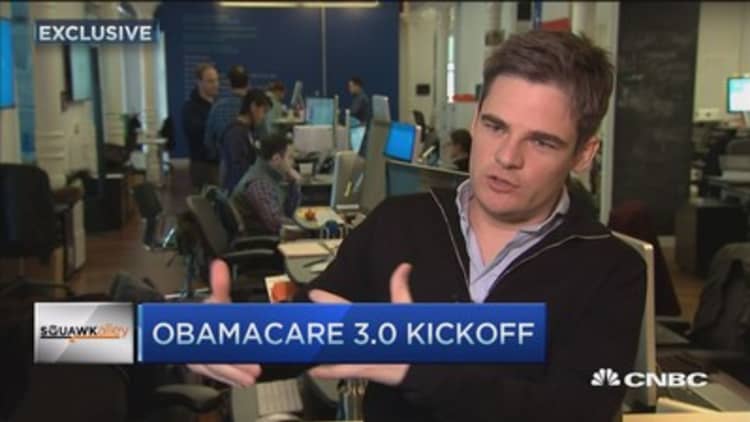
For software firm Tools4ever, signing with one of New York's start-up insurers in 2014 seemed like a good fit. Rates from nonprofit Health Republic of New York were $6,000 lower than those of competitors.
"It was a substantial amount of money that it was going to save our company," said Dean Wiech, president of the Long Island, New York-based firm whose experience was featured in a Health Republic television ad two years ago.
This fall, when it was time to renew, it was very a different story.
"We had received notice that they were going to increase our rates between 19 percent and 29 percent this year," Wiech said. "And then shortly after receiving that notification, we learned they were closing their doors."
It was an abrupt turnabout. Health Republic's low prices had made it the second-most popular insurer on New York state's health exchange, enlisting 200,000 members. But it was paying out more in medical costs than it took in. When federal officials set reimbursement to insurers for Obamacare plan losses well below expectations, it left the insurer deep in the red. Regulators forced Health Republic to shut down just weeks before the start of 2016 open enrollment.
The fact that reimbursements are only paying out about 12 percent of what was promised "is a major challenge, and it would be for any business," said Ceci Connolly, managing director of PwC's Health Research Institute.
An Immature Health Exchange Market
The reimbursement shortfall has impacted both established and new players, but it was a deadly blow for nearly half of the so-called co-ops such as Health Republic launched with billions in federal funds as part of an Obamacare program to foster competition on the exchanges.
"I think what we saw with the co-ops was the immaturity of that model and the anticipation that they could, quote-unquote, somehow hold the big health plans honest by pricing at a level that captured a lot of membership," said Mark Bertolini, chairman and CEO of Aetna during a conference call with analysts. "And we knew that that was going to be troublesome and unsustainable."
In New York state, Health Republic was one of three start-up insurers that launched with the debut of the Affordable Care Act exchanges in 2014. The other two insurers have also experienced growing pains, but both are preparing to expand as they begin their third ACA open enrollment season.
Oscar, CareConnect Expand for 2016
Venture-backed Oscar Health lost $27.5 million in 2014, after taking in nearly $60 million in premiums. Still, the firm neary doubled its membership in the first two years. Now, with $30 million in new funding from Google ventures is hoping to break even soon, expanding into California and Texas for 2016, and co-founder and CEO Mario Schlosser said the firm expects to break even soon in New York and New Jersey.
"We generally think we can get to profitability ... two or three years or so after we join new markets," he said, adding that Oscar's web and mobile-based interface, along with tight health provider networks, helps to streamline costs.
"We are only going into markets where we can find a partner on the delivery side — hospitals, physician groups — that understand what we want to achieve, and which we can really integrate," he said.
Similar struggles were felt by Long Island-based North Shore LIJ hospital's insurance plan CareConnect garnered 4 percent market share on New York's exchange with a narrow regional operation when it launched two years ago. As it expanded affiliations with New York area hospitals in 2015, its market share fell one point on the exchange, though the insurer says it was offset by growth in its off-exchange business.
Yet, CareConnect's CEO said the firm's growth is proceeding according to plan, and its ability to coordinate patient care through its hospitals and clinics has helped keep medical costs and pricing in line.
"If you were a small group employer, in 2014 with CareConnect and you have the same plan, you are paying lower today than you would have been when you started with care connect," said Alan Murray, CareConnect CEO.
Beyond Start-ups
The start-ups could pick up more market share from some of Health Republic's clients now forced to switch, but they won't get Tools4ever's business.
The Long Island small business has found for coverage from a larger established insurer this year, which they found through a professional employer organization benefits management firm.
"Historically we're told that the rates are only increasing 7 to 9 percent a year versus 20 to 30 percent," in the small business market, said Wiech. "So I'm optimistic that this will work out for us."
For now, the firm has opted against start-ups and plans on the Obamacare health exchanges.
Correction: Long Island-based North Shore LIJ hospital's insurance plan CareConnect garnered 4 percent market share on New York's exchange with a narrow regional operation when it launched two years ago. As it expanded affiliations with New York area hospitals in 2015, its market share fell one point on the exchange, though the insurer says it was offset by growth in its off-exchange business. The market share was misstated in an earlier version of this article.



